-
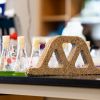 +13 +1
+13 +1Self-growing bricks, self-healing building materials from bacteria may be the future of construction industry
Biologists are working to come up with ways to grow office complexes and homes from a type of cyanobacteria that flourishes in oceans.
-
 +22 +1
+22 +1Polluting gases fall rapidly as coronavirus spreads
Levels of air pollutants and warming gases over some cities and regions are showing significant drops as coronavirus impacts work and travel.Researchers in New York told the BBC their early results showed carbon monoxide mainly from cars had been reduced by nearly 50% compared with last year.
-
 +3 +1
+3 +1Life could have emerged from lakes with high phosphorus
Life as we know it requires phosphorus. It’s one of the six main chemical elements of life, it forms the backbone of DNA and RNA molecules, acts as the main currency for energy in all cells and anchors the lipids that separate cells from their surrounding environment. But how did a lifeless environment on the early Earth supply this key ingredient?
-
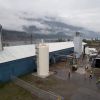 +27 +1
+27 +1New industry develops around sucking carbon dioxide out of atmosphere | CBC News
Carbon Engineering's groundbreaking plant is one of many projects hoping to help in the fight against climate change by turning its main driver — carbon dioxide — into a useful product that can be profitably removed from the atmosphere.
-
 +21 +1
+21 +1Don't discount carbon capture just yet, study says. It could go underwater.
Humanity has some quick approaching deadlines to meet in the coming years if we want to stave off the worst effects of climate change, and scientists say one solution, carbon capture and storage (CCS), is ready to start today — but it’s not an option many people aren’t thrilled about.
-
 +18 +1
+18 +1The World Solved the Ozone Problem. It Can Solve Climate Change.
Nearly 50 years ago, three chemists named Mario Molina, Sherwood Rowland and Paul Crutzen found evidence that chlorofluorocarbons, chemicals known as CFCs and released from aerosol sprays, were weakening the ozone layer that functions as the earth’s natural sunscreen protecting humans, animals and plants from harmful radiation.
-
 +17 +1
+17 +1Scientists Demand 'Paradigm Shift' After Study Shows 'Frightening' Decline of Insects and Spiders
"A decline on that scale over a period of just 10 years came as a complete surprise to us," said one researcher, "but fits the picture presented in a growing number of studies."
-
 +8 +1
+8 +1Greta Thunberg is right: It’s time to haul ass on climate change
When Swedish climate activist Greta Thunberg addressed the elites assembled at the World Economic Forum in Davos, she concluded with a simple message: “I want you to act as if our house is on fire.” For those elites, it was unfamiliar language. They are accustomed to talking about climate change, but typically such talk amounts to ritual invocations of “urgency” coupled with promises about what might be achieved in 2030 or 2050.
-
 +21 +1
+21 +1Greta Thunberg: ‘We are ignoring natural climate solutions’
The protection and restoration of living ecosystems such as forests, mangroves and seagrass meadows can repair the planet’s broken climate but are being overlooked, Greta Thunberg and George Monbiot have warned in a new short film. Natural climate solutions could remove huge amounts of carbon dioxide from the atmosphere as plants grow. But these methods receive only 2% of the funding spent on cutting emissions, say the climate activists.
-
 +26 +1
+26 +1The climate apocalypse is here. You have one last chance to stop it
Do you understand the causes and effects of climate change? Here is what you can do to help.
-
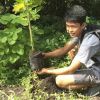 +4 +1
+4 +1Philippines law would require students to plant 10 trees if they want to graduate
Philippines is one of the most deforested areas among other counties around the globe. The total forest area of the Philippines has decreased from 70 % to 20% in few years which has led to many problems such as floods and landslides. The Philippine law parliament is now concerned about its environment has decided to pass a law that states that students in order to graduate have to plant more than 10 trees while in college.
-
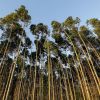 +10 +1
+10 +1Scientists say sustainable forestry organizations should lift ban on biotech trees
Look at anything made from trees—a ream of paper, a cardboard box, lumber—and it's probably stamped with the logo of the Forest Stewardship Council (FSC) or an equivalent organization. These nonprofits certify that forests are managed sustainably, and one common requirement is no genetically modified (GM) trees. But that ban hinders research and should change, researchers say in today's issue of Science. The technology, they argue, has important potential to remedy many pressing problems facing forests.
-
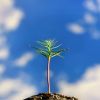 +14 +1
+14 +1Mega-Trees Are the New Weapon Against Climate Change
Scientists caution that we probably can’t “plant our way out” of the climate crisis, but growing big trees and keeping them around is an important piece of the puzzle.
-
 +19 +1
+19 +1China is on track to meet its climate change goals nine years early
China appears on track to reach its carbon goals up to nine years earlier than planned under the Paris agreement, in a potential huge boost for efforts to tackle climate change.
-
 +17 +1
+17 +1High-value opportunities exist to restore tropical rainforests around the world – here’s how we mapped them - questbuzz.com
The green belt of tropical rainforests that covers equatorial regions of the Americas, Africa, Indonesia and Southeast Asia is turning brown. Since 1990, Indonesia has lost 50% of its original forest, the Amazon 30% and Central Africa 14%. Fires, logging, hunting, road building and fragmentation have heavily damaged more than 30% of those that remain.
-
 +4 +1
+4 +1Scientists Are Genetically Engineering Plants to Fight Climate Change
Scientists have figured out how to genetically engineer plants to grow deeper roots, potentially improving carbon storage, drought resistance, and flood protection. This research comes as part of the Salk Institute’s Harnessing Plants Initiative, which seeks to use plants to capture carbon from the atmosphere and store it in the ground.
-
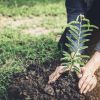 +10 +1
+10 +1Study: Climate change can be reversed by planting a forest nearly double the size of the U.S.
A new study suggests that human beings could save themselves from the worst ravages of climate change by planting a forest nearly double the size of the area of the United States.
-
 +3 +1
+3 +1Adding 1 billion hectares of forest could help check global warming
Global temperatures could rise 1.5° C above industrial levels by as early as 2030 if current trends continue, but trees could help stem this climate crisis. A new analysis finds that adding nearly 1 billion additional hectares of forest could remove two-thirds of the roughly 300 gigatons of carbon humans have added to the atmosphere since the 1800s.
-
 +20 +1
+20 +1Artificial photosynthesis transforms carbon dioxide into liquefiable fuels
Chemists at the University of Illinois have successfully produced fuels using water, carbon dioxide and visible light through artificial photosynthesis. By converting carbon dioxide into more complex molecules like propane, green energy technology is now one step closer to using excess CO2 to store solar energy—in the form of chemical bonds—for use when the sun is not shining and in times of peak demand.
-
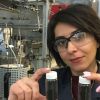 +4 +1
+4 +1Calgary researchers turn greenhouse gases into valuable carbon nanofibres
A researcher at the University of Calgary says she has developed a method of turning greenhouse gases into valuable carbon nanofibres. Mina Zarabian came up with the concept while completing her doctorate in chemical and petroleum engineering at the university's Schulich School of Engineering.
Submit a link
Start a discussion




















